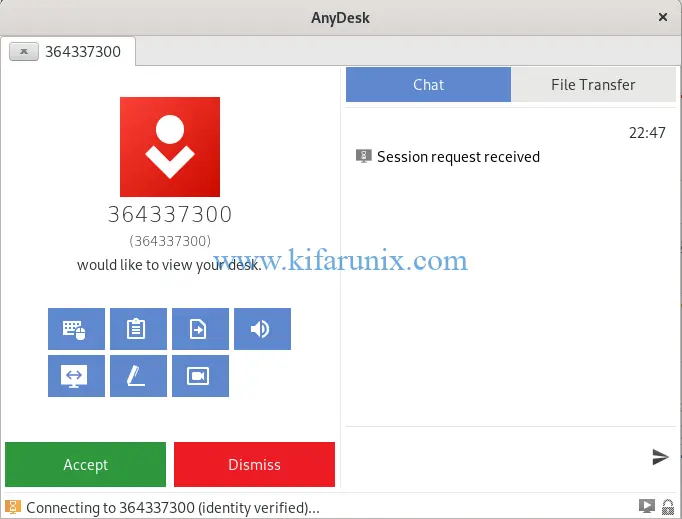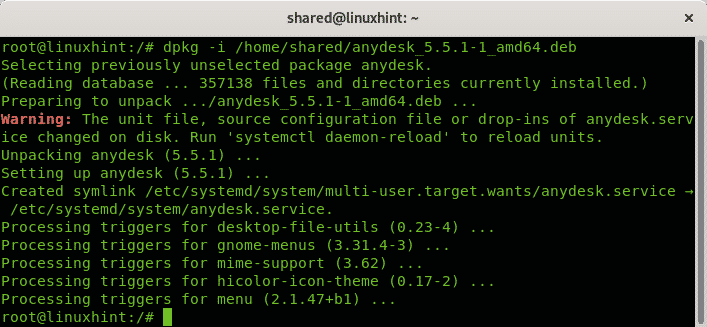
AnyDesk is a remote maintenance solution for 28 languages and 8 platforms.
Run AnyDesk portable or installed, ready within couple of seconds.
Find AnyDesk for your platform in the Download section.
See also: StartUp and Close AnyDesk for differences of the portable and installed version.
The installation can be performed via Command Line. See also: Automatic Deployment
How to install and use Teamviewer/Anydesk on Raspberry Pi? Raspberry Pi is a low-cost and compact single-board computer as small as size of your palm. Though not powerful enough to perform complex jobs, it is still capable of serving purposes of academic study, hobbyist interest, and very light-weight multi-purpose server. To Install AnyDesk on Centos 7. AnyDesk is the open source remote desktop application. It is one of the world’ s most comfortable remote desktop application. Access all your programs, documents and files from anywhere, without having to entrust your data to a cloud service.
- Once inside the “Downloads” directory, use the dpkg command to install the Anydesk DEB package on your Debian Linux PC. Sudo dpkg -i anydesk6.0.1-1amd64.deb After installing the package on Debian, you will need to correct any dependency issues that may have arisen by using the apt-get install -f command.
- Download AnyDesk Binary Installer To install AnyDesk on Ubuntu 18.04, navigate to the Linux AnyDesk installer downloads page and download the debian binary package for Ubuntu. You can simply use wget to get the binary. Wget https://download.anydesk.com/linux/anydesk5.1.0-1amd64.deb.
- The mobile platforms Android and iOS are distributed via Play Store, Apple App Store as well as the Amazon Store.
- For Red Hat and Debian compatible Linux distributions AnyDesk offers repositories.
Customers with Professional or Power license may use a customized client, called custom-client.
Custom-clients are generated in AnyDesks web-interface namely MyAnyDesk Portal providing individual settings, permissions, and logo.
Note: AnyDesk is capable of running several instances. Users can run both default-client and custom-clients at the same time.
List of supported Operating Systems


| Windows |
|---|
| XP SP2 |
| Windows 7 |
| Windows 8.1 |
| Windows 10 |
| Windows Server |
|---|
| 2003 SP2 |
| 2008 R2 |
| 2012 |
| 2016 |
| 2019 |
| macOS |
|---|
| 10.11 El Capitan¹ |
| and newer |
| Android |
|---|
| 4.4 Ice Cream Sandwich |
| Amazon Fire OS 4 |
| and newer |
| ChromeOS |
|---|
| Devices with PlayStore |

Install Anydesk Debian 8
| Linux |
|---|
| Ubuntu 18.04 and newer LTS releases |
| Debian 9 and newer |
| Fedora 29/30/31/32 |
| CentOS Linux 7 and 8² |
| Red Hat Enterprise Linux (RHEL) 7 and newer |
| OpenSUSE 42/15 |
| Raspberry Pi |
|---|
| Raspberry Pi 2 and newer |
| Only Raspbian and |
| Raspberry Pi OS (32bit) is supported |
¹ Older Versions of AnyDesk that supports macOS 10.10 can be found here.
² Until CentOS Linux 8 end-of-life
How To Install Anydesk
Note: please keep in mind that on Wayland sessions, selectable in login screen, only outgoing sessions are supported. Incoming sessions are possible only within Xorg session.
Installation instructions
| Windows | download the installation .exe file from Download page of AnyDesk web pages, execute it and optionally install AnyDesk as a service |
|---|
| macOS | download the installation .dmg file from Download page of AnyDesk web pages, execute it and optionally install AnyDesk as a service |
|---|
| iOS and Android | access application store for the platform, either Play Store or App Store and install the application directly |
|---|
| FreeBSD | download the .tar.gz file from Download page of AnyDesk web pages, extract the content and and execute the binary |
|---|
| Linux | for Debian and Red Hat compatible Linux distributions we strongly recommend to use the AnyDesk Linux repositories described below, for other distributions the .tar.gz file with can be downloaded from Download page of AnyDesk web pages |
|---|
Is Anydesk Secure
Linux repositories and installation
Recommended way how to install AnyDesk on Debian and Red Hat compatible Linux distributions is using official AnyDesk repositories which provide last stable version:
| Debian compatible | follow howto instructions provided on the repository server http://deb.anydesk.com/howto.html |
|---|
| Red Hat compatible | follow howto instructions provided on the repository server http://rpm.anydesk.com/howto.html |
|---|
For specific situations repositories with older AnyDesk versions (after v5) are also available:
| Debian compatible | follow howto instructions provided on the repository server http://deb-archive.anydesk.com/howto.html |
|---|
| Red Hat compatible | follow howto instructions provided on the repository server http://rpm-archive.anydesk.com/howto.html |
|---|
Note: All the commands from the above howto instruction must be executed as root user.
Ubuntu Anydesk Autostart
The last AnyDesk for Linux supporting RHEL/CentOS 6 and older versions of Debian/Ubuntu is v5.0.0 and is available for download (including previous version) here https://download.anydesk.com/linux/
For other distributions AnyDesk is also provided in .tar.gz archives available for download at Download area of AnyDesk web page, however these installations are not officially supported. Please follow a README file in the archive itself to detailed information.
Needed dependencies on Linux: libc6 (>= 2.7), libgcc1 (>= 1:4.1.1), libglib2.0-0 (>= 2.16.0), libgtk2.0-0 (>= 2.20.1), libstdc++6 (>= 4.1.1), libx11-6, libxcb-shm0, libxcb1, libpango1.0-0, libcairo2, libxrandr2 (>= 1.3), libx11-xcb1, libxtst6, libxfixes3, libxdamage1 and libgtkglext1.




